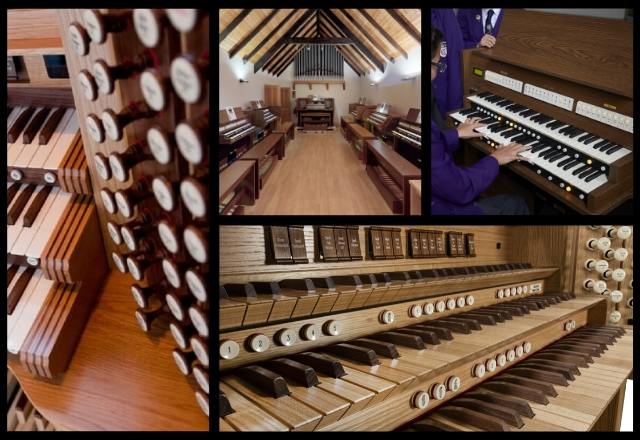Buying a digital organ is similar in scope to purchasing a new car. Model and specifications vary, and the final choice is often guided by personal preference. A digital organ, whether purchased for use at home, in a church or a concert hall, is an investment that should give you many years – even decades! – of enjoyment. Which is why below you can find ten points we consider important when buying a digital organ.
Tip 1: Price is not a reliable guide to instrument quality
In most markets, consumers would feel that the more a product costs the better it will be. After all, that is common sense isn’t it? When it comes to buying a digital organ—or any musical instrument, for that matter—price is not the best indicator of quality. A musical instrument is, above all, a matter of great personal taste and you should let your ears guide your musical choice not the price tag. For this reason, you really must follow tip 2.
Tip 2: Arrange to play the organ yourself before buying it
When buying a digital organ, there is nothing more important than testing out the instrument for yourself. This gives you a good feel for how comfortable you will be with any particular model of organ (there are many to choose from).
Any supplier should be more than happy for you to try out their digital organs. Arrange a visit to their premises. We do this for our prospective customers at our Bicester showroom, as well as around the country at our sub-dealers’ locations (for Australia you can read about our partnership with 3 Monkeys Audio Visual in Perth).
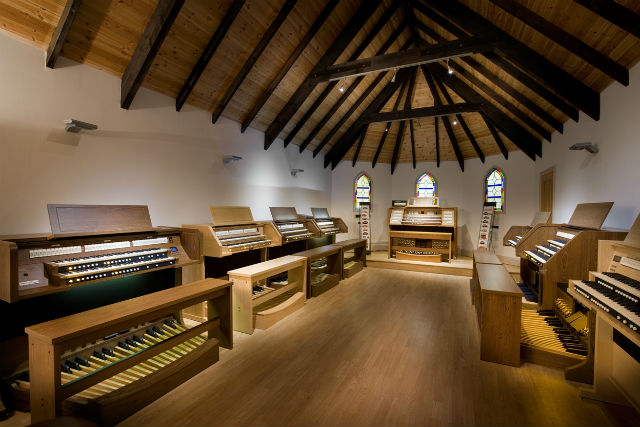
Tip 3: Don’t forget to focus on the keyboards
The keyboards of a digital organ are the vital bridge between musician and instrument. Unlike a violin bow which you can easily change, the keyboards are a fixed part of the instrument and come in a great many different finishes and weights. Touch is a vital part of an organ. Touch allows the musician to articulate the musical line. A good manufacturer will offer you a choice of organ keyboards, which should be available to try out in their showroom.
Tip 4: Look for reviews or recommendations from existing digital organ owners
What better insight to get than from existing digital organ players? Ask your supplier to introduce you to some existing customers – whether they are in local churches or private customers. Any reputable supplier will be happy to do this.
Tip 5: Compare the sound of different digital organ models
The perception of tonal quality will always be a matter of personal judgement. It is also very difficult to carry effective ‘memory’ of the sound heard yesterday with the one you listen to today. Sound is personal and taste can change. When buying a digital organ as a home practice instrument, consider the size of the console, as it will have an impact on the sound quality. For example, digital organs with a 32-note pedal board will be slightly larger than those with the smaller 30-note pedal board. Generally speaking, the larger cabinet will give a slightly stronger tone in the bass region.
Our advice is to try to compare the quality of sound from the different models of organs together or with minimal gap if you can.
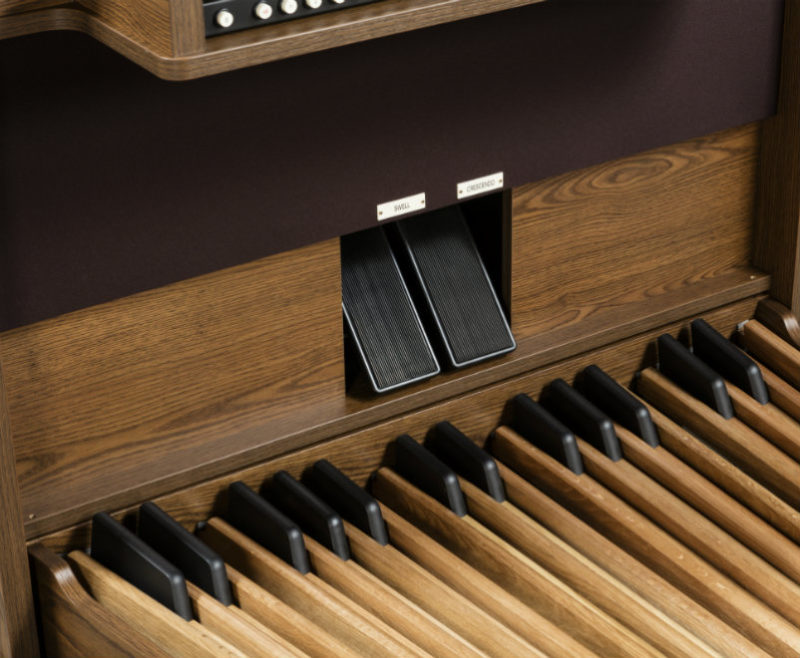
Tip 6: Explore what additional features an instrument might offer.
Digital organs offer features not usually found on pipe organs. Some are gimmicks, but many can be useful for the musician. For example, pianists might enjoy a feature called ‘autopedal’, which adds the pedal stops to lowest note of the left hand. Very useful if you are not comfortable using the pedal board. On many digital organs, you will find a transposer which moves the piece up or down by a number of semitones. Some musicians can do this without thinking, but if you only have available Hark the Herald Angels in G and your sopranos are struggling with the top ‘G’ you can play it in F at the flick of a switch.
Also – ask how difficult it would be for your supplier to provide you with a palette of sounds to listen to. Remember that you still can expect to experience this kind of flexibility on instruments under £10k – this is the beauty of digital organs!
Tip 7: Make sure that you are covered for servicing and repairs
Although today’s digital organs are extremely reliable and seldom need a service visit, it’s worth choosing a supplier that will be there when and if you need them. If you are buying a digital organ for a church for example, your issues may become time critical – so be sure to check your supplier can help you at short notice.
The three main digital organ suppliers (in the UK) have full time service engineers. Smaller suppliers may have to subcontract this to independent engineers.
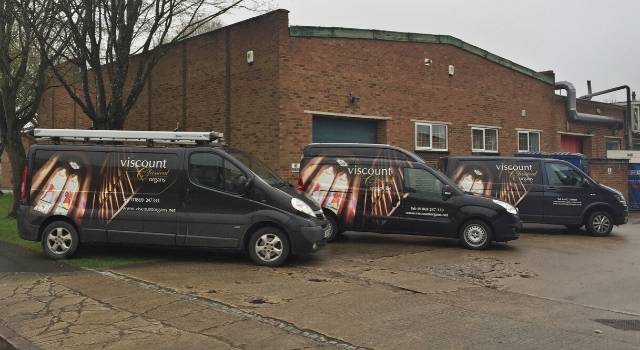
Tip 8: Look at your organ as an investment
Whether you are looking to buy your digital organ for personal use at home, for a church, school, crematorium or concert hall it is worth to consider the overall purchase as an investment. You may be interested to know that the market trend of late has shown digital organs to hold their value on the pre-owned and used retail sales market as well as in part-exchange against newer instruments.
Tip 9: Take care not to be overly influenced by propaganda
There is much written that suggests a pipe organ is for life while a digital instrument will need replacing in under 15 years. Neither statement is correct. It is true that smaller mechanical action instruments will serve for many decades with minimal maintenance issues bar tuning. Larger instruments with electric or pneumatic action require regular and very often expensive rebuilds.
Digital instruments from 30 and even 40 years ago are still giving good service in many homes and churches. It’s often the case that when these need a repair, the sound quality they give does not merit an expensive repair when set against the cost of a new instrument with its new warranty and far better sound quality. Just as with any electrical item, eventually the repair will become less attractive compared to replacement. This is certainly the case today for instruments made decades ago. However, I believe that new digital instruments will last even longer as their earlier incarnations, as manufacturing quality continues to improve, and today’s sound quality is really excellent.
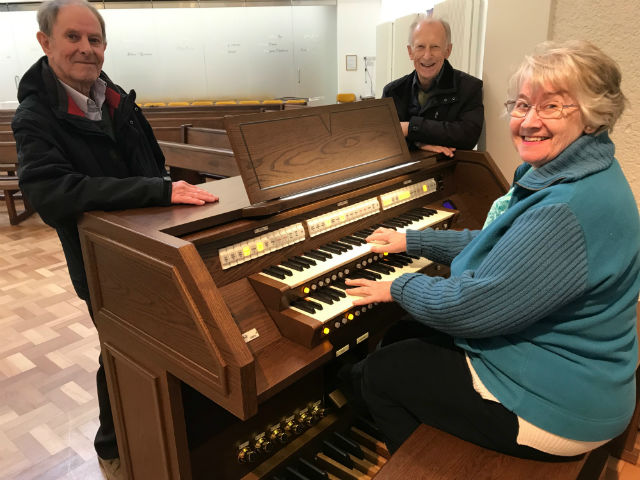
Tip 10: Last but not least be sure of the financial standing of the company you are looking to deal with.
For added peace of mind, check out the financial strength of the company you are dealing with. Some companies are better funded than others and you should include in your consideration an assessment of the likelihood of the company being there in the future when you may need them to attend to any work that may be required.
We hope our ten top tips to consider when buying a digital organ are useful. If you’d like to talk to us about our digital organs then please contact us.
Explore the Viscount range of digital organs on our website or take a tour of our virtual showroom. We suggest you arrange a visit to our showroom, alternatively contact one of our Viscount dealers, to play our instruments before you make a decision.
I have had a passion for church organs since the tender age of 12. I own and run Viscount Organs with a close attention to the detail that musicians appreciate; and a clear understanding of the benefits of digital technology and keeping to the traditional and emotional elements of organ playing.
